The enigmatic constellation of Ophiuchus has long fascinated astronomers, astrologers, and mythologists alike. With its unique blend of astronomical significance and rich mythical lore, Ophiuchus offers a captivating glimpse into the intricate tapestry of ancient beliefs. In this article, we will delve into the multi-faceted influences on Ophiuchus, examining its role in both ancient mythology and modern interpretations. From its introduction in astronomy to its associations with other cosmic entities, we will explore the depths of Ophiuchus’ celestial narrative. Join us on this journey as we unravel the mysteries surrounding this enigmatic constellation and its fascinating place in the ancient world.
Contents
- 1. The Significance of Ophiuchus
- 2. The Legend of Ophiuchus
- 3. Astronomical Associations with Ophiuchus
- 4. Connections to Other Ancient Mythologies
- 5. Contemporary Perceptions and Interpretations
- Conclusion
-
Frequently Asked Questions
- 1. What is the significance of Ophiuchus?
- 2. Is Ophiuchus considered a zodiac sign?
- 3. Who was Asclepius, and what is his connection to Ophiuchus?
- 4. What are the personality traits associated with Ophiuchus?
- 5. Can Ophiuchus influence career choices?
- 6. How does Ophiuchus differ from other constellations?
- 7. Are there any historical observations or mentions of Ophiuchus?
- 8. How has modern astrology incorporated Ophiuchus?
- 9. Where can Ophiuchus be seen in the night sky?
- 10. How is Ophiuchus portrayed in popular culture?
- References
-
Frequently Asked Questions
- 1. What is the significance of Ophiuchus in ancient mythology?
- 2. How was Ophiuchus introduced in astronomy?
- 3. What role does Ophiuchus play in astrology?
- 4. What are the mythological origins of Ophiuchus?
- 5. What is the symbolism behind the Serpent Bearer?
- 6. What is the connection between Ophiuchus and the constellation?
- 7. How did Ophiuchus influence Greek and Roman mythologies?
- 8. What role did Ophiuchus play in Mesopotamian and Egyptian mythologies?
- 9. How is Ophiuchus perceived in modern astrology?
- 10. How does Ophiuchus feature in popular culture?
- References
- Read More
1. The Significance of Ophiuchus
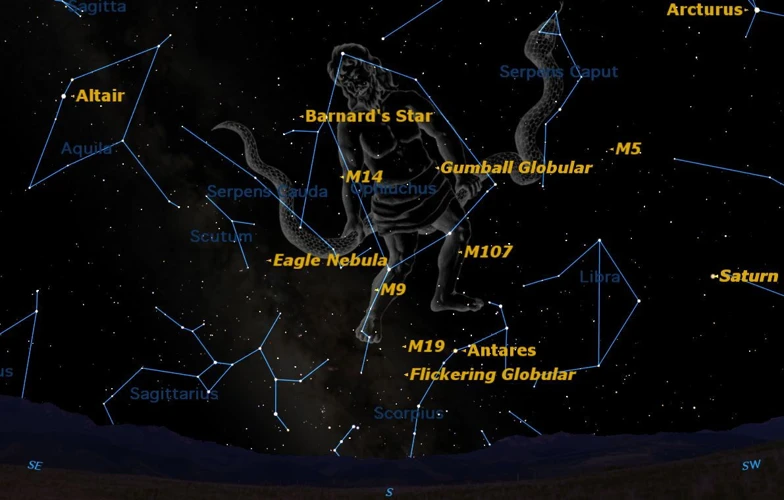
The introduction of Ophiuchus in astronomy holds significant importance in understanding its celestial significance. Ophiuchus is one of the 88 officially recognized constellations in the night sky. It is located near the celestial equator and can be seen in both the northern and southern hemispheres. The constellation represents a figure known as the Serpent Bearer or the Snake Charmer. Ophiuchus was first cataloged by the Greek astronomer Claudius Ptolemy in the 2nd century. It is characterized by its distinct shape, resembling a man holding a serpent. This celestial figure is often associated with the Greek god of medicine, Asclepius, due to the constellation’s resemblance to his staff, entwined by a serpent. Ophiuchus holds a unique place in astronomical studies as the only zodiacal constellation that does not represent an astrological sign. Its position in the sky and its association with healing and medicine contribute to its significance in both ancient and contemporary understanding.
While Ophiuchus does not represent an astrological sign in the traditional zodiac, its existence has sparked interest and debate among astrologers. Some argue for the inclusion of Ophiuchus as a 13th zodiac sign, disrupting the conventional alignment of the zodiac calendar. Proponents of this idea attribute specific personality traits and characteristics to individuals born under Ophiuchus. They claim that those born between November 29 and December 17 possess qualities such as wisdom, intuition, and healing abilities. These alternative perspectives on the zodiac sign have intrigued many and have led to further explorations into the potential influences of Ophiuchus on personality, relationships, and even career choices. Whether one aligns with traditional astrology or embraces the concept of Ophiuchus as an additional sign, the significance and interpretation of this celestial entity continue to be subjects of ongoing interest and discussion.
1.1. The Introduction of Ophiuchus in Astronomy
The introduction of Ophiuchus in astronomy dates back to the 2nd century when the Greek astronomer Claudius Ptolemy cataloged the constellation. Ophiuchus, also known as the Serpent Bearer or the Snake Charmer, is one of the 88 officially recognized constellations in the night sky. It is situated near the celestial equator and is visible from both the northern and southern hemispheres. This constellation is characterized by its distinctive shape, which resembles a figure holding a serpent. The association of Ophiuchus with the Greek god of medicine, Asclepius, is evident in its depiction, with the constellation resembling Asclepius’ staff entwined by a serpent. This connection has led to interpretations of Ophiuchus as a symbol of healing and medicine. Despite not representing an astrological sign in the traditional zodiac, Ophiuchus’ introduction in astronomy has captured the fascination of astronomers and sky watchers who appreciate its unique celestial presence. Its position in the night sky and its association with healing contribute to its enduring significance in the field of astronomy.
1.2. Ophiuchus in Astrology
Ophiuchus in astrology is a topic of much debate and intrigue. While not traditionally recognized as one of the twelve zodiac signs, Ophiuchus has gained attention in recent years as a potential addition to the astrological framework. Proponents of including Ophiuchus as the thirteenth zodiac sign argue that it offers unique insights into personality traits and influences on individuals born during its corresponding dates. These individuals are said to exhibit traits such as intuition, wisdom, and a deep connection to healing energies. The addition of Ophiuchus to astrology would create a shift in the alignment and interpretation of the zodiac calendar, affecting the sun sign assignments for millions of people. However, it is important to note that mainstream astrology does not officially recognize Ophiuchus as a zodiac sign, and opinions on its inclusion remain divided. Whether one embraces Ophiuchus as an astrological sign or not, the exploration of its potential impact on personality, relationships, and career choices continues to captivate the interest of astrology enthusiasts and those seeking a deeper understanding of their cosmic connections. To learn more about Ophiuchus’ traits and their possible influence on career choices, you can refer to our article on “Ophiuchus Traits and Career Choices.”
2. The Legend of Ophiuchus
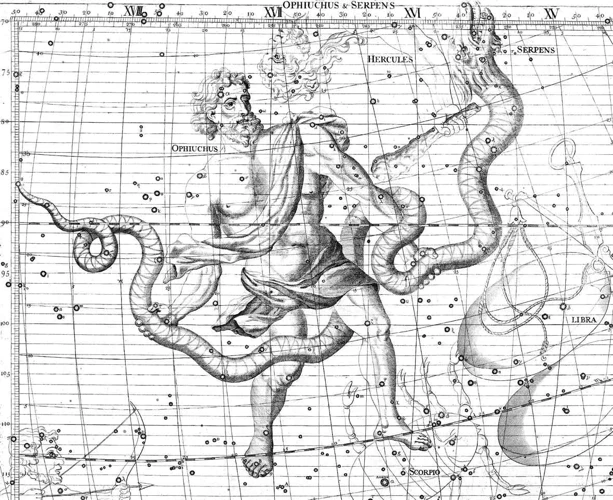
The mythological origins of Ophiuchus trace back to Greek mythology, where it is strongly associated with the god of medicine and healing, Asclepius. According to the legend, Asclepius was the son of the Greek god Apollo and a mortal woman named Coronis. Asclepius had remarkable healing abilities and was known for his skill in reviving the dead. However, his powers caught the attention of Zeus, the king of the gods, who worried that Asclepius’ abilities would disrupt the natural order of life and death.
In one version of the myth, Zeus struck down Asclepius with a thunderbolt, condemning him to death. Grief-stricken by the loss of his son, Apollo sought revenge by killing the Cyclops who had forged Zeus’ thunderbolts. As punishment, Zeus forced Apollo to serve a mortal king named Admetus for a year. During this time, Apollo learned the art of medicine from the wise centaur Chiron. It is said that Apollo then passed on his knowledge of healing and medicine to his mortal son, Asclepius, making him an expert in the field.
Another version of the myth tells of Asclepius using his healing skills to revive a deceased person. This act angered Hades, the god of the Underworld, as it interfered with the realm of the dead. To prevent further disruptions, Zeus transformed Asclepius into the constellation Ophiuchus, forever tying him to the heavens and immortalizing his healing abilities.
The symbolism of the Serpent Bearer in Ophiuchus is connected to both the staff of Asclepius and the ancient practice of snake symbolism in healing. The staff, known as the Rod of Asclepius, features a serpent entwined around a staff and has become a symbol associated with medicine and healing. Snakes were seen as sacred creatures in ancient Greek and Roman cultures, representing rebirth, regeneration, and transformation. The association of Ophiuchus with snakes and healing further emphasizes its significance in the mythological context.
The legend of Ophiuchus not only highlights the divine origins of its mythical figure but also underscores the reverence for healing and medicine in ancient societies. These tales serve as a testament to the deep cultural and symbolic connections between the celestial realm and the human understanding of life, death, and the pursuit of health and well-being.
2.1. The Mythological Origins
The mythological origins surrounding Ophiuchus are rooted in ancient Greek mythology. According to the legends, the figure represented by the constellation is associated with the god Asclepius, the son of Apollo and the mortal Coronis. Asclepius was renowned for his healing abilities and was worshipped as the god of medicine and physicians. The story goes that Asclepius became such a skilled healer that he had the power to not only cure illness and injuries but also bring the dead back to life. This ability alarmed the gods, who feared that it would upset the balance between life and death. As a punishment for his audacity, Zeus, the king of the gods, struck Asclepius with a thunderbolt, killing him. In recognition of his contributions, Asclepius was immortalized as an eternal constellation, Ophiuchus, forever holding the serpent that symbolizes healing and medical knowledge.
2.2. The Symbolism of the Serpent Bearer
The symbolism of the Serpent Bearer in Ophiuchus carries significant meaning in both ancient mythology and modern interpretations. The figure of the Serpent Bearer, depicted as a man holding a serpent, holds various symbolic representations. First and foremost, the serpent itself holds symbolism across cultures, often associated with wisdom, transformation, and healing. In Greek mythology, the serpent is closely linked to the god of medicine, Asclepius, who is often depicted with a staff entwined by a serpent, known as the Rod of Asclepius. This association highlights the healing and medicinal aspects connected to the Serpent Bearer.
The image of the Serpent Bearer also symbolizes the balance between life and death, as well as the duality of nature. Ophiuchus is often portrayed as taming or controlling the serpent, representing the ability to harness and utilize the power of transformation and regeneration. This symbolism is closely tied to the concept of rebirth and the ability to heal oneself and others. The Serpent Bearer signifies the transformative journey of embracing and overcoming challenges, ultimately leading to personal growth and enlightenment.
In modern interpretations, the symbolism of the Serpent Bearer in Ophiuchus has often been associated with alternative healing modalities and the pursuit of holistic wellness. Individuals who resonate with Ophiuchus may find themselves drawn to careers in fields such as alternative medicine, energy healing, or spiritual practices that focus on transformation and personal development. The symbolism of the Serpent Bearer also emphasizes the importance of embracing change and adapting to new circumstances, making it particularly relevant in today’s fast-paced and ever-evolving world.
The enduring symbolism of the Serpent Bearer in Ophiuchus continues to captivate the imagination and spark curiosity among those who explore the mysteries of the cosmos and seek to understand the profound connections between celestial entities and human existence. Whether one views Ophiuchus and its symbolism from a mythological, astrological, or personal perspective, it remains a source of inspiration and contemplation for those who embark on a journey of self-discovery and transformation.
3. Astronomical Associations with Ophiuchus
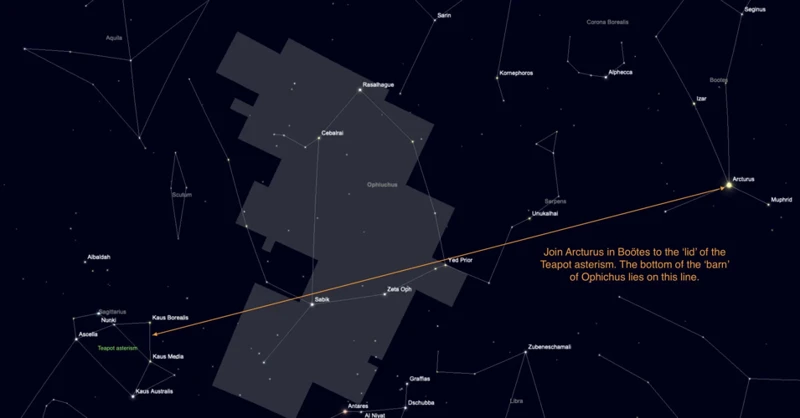
The constellation of Ophiuchus holds significant astronomical associations that deepen our understanding of its celestial role. Ophiuchus is located in a region of the sky known as the “Milky Way,” which is a dense band of stars, dust, and gas. It lies between the constellations of Scorpius and Sagittarius, making it a prominent feature in the summer night sky of the northern hemisphere.
3.1. The Constellation of Ophiuchus:
Ophiuchus is easily identifiable by its distinctive shape, comprising of a curved body and outstretched arms. It is often depicted as a figure holding a serpent, symbolizing the Greek god of medicine, Asclepius. The constellation is home to several notable celestial objects, including the Ophiuchus Cluster, a grouping of galaxies around 390 million light-years away. This cluster contains a rich collection of galaxies, making it an area of interest for astronomers studying cosmology and galaxy formation.
3.2. Ophiuchus and the Zodiac:
While Ophiuchus is not traditionally recognized as one of the twelve zodiacal constellations, it does intersect with the ecliptic, the apparent path of the Sun across the sky. This means that the Sun passes through Ophiuchus for a short period each year, around November 30 to December 18. This alignment has led to discussions about the potential influence of Ophiuchus on astrological readings. Though not officially part of the zodiac, some astrologers attribute specific traits and characteristics to those born during this period, considering them Ophiuchus-born individuals.
3.3. Ophiuchus in Ancient Observations:
Ophiuchus has been observed and recorded by various ancient civilizations, including the Greeks and Egyptians. The Greeks associated this constellation with the god of medicine, Asclepius, and it is often depicted in ancient artworks and temples. The Egyptians linked Ophiuchus with their god Imhotep, who was also associated with healing and medicine. The prominence of Ophiuchus in ancient cultures highlights its perceived importance and connection to healing and spiritual practices.
The astronomical associations of Ophiuchus provide fascinating insights into its celestial significance and its place within the broader context of the night sky. Whether viewed through the lens of constellations, zodiacal alignments, or ancient observations, Ophiuchus continues to captivate the imagination and intrigue astronomers and stargazers alike.
3.1. The Constellation of Ophiuchus
The constellation of Ophiuchus is an intricate and fascinating celestial formation that holds its own distinct characteristics and features. Its name, derived from the Greek word meaning “serpent bearer,” is fitting for its representation in the night sky. Ophiuchus is depicted as a figure clasping a large snake, symbolizing the mythical serpent that winds its way through the heavens. In terms of physical appearance, the constellation is comprised of several main stars, including Rasalhague and Sabik, which are among the brightest in the constellation. These stars form the body and head of Ophiuchus, while the rest of the constellation takes the shape of a man holding the snake. The intricate details of the constellation make it a fascinating subject for stargazers and astronomers alike.
Ancient civilizations, such as the Greeks and Romans, assigned numerous mythological tales and meanings to the constellation of Ophiuchus. In Greek mythology, Ophiuchus is often associated with the god Asclepius, who was renowned for his healing abilities. The constellation’s depiction of a man holding a serpent is said to represent Asclepius holding a staff with a snake wrapped around it, symbolizing his mastery over medicine and healing. The Romans, on the other hand, identified the constellation as the god of health and medicine, Aesculapius. They believed that those born under the influence of Ophiuchus possessed great knowledge and skill in the medical field.
In addition to its mythical associations, the constellation of Ophiuchus also has scientific significance. It is located near the celestial equator, making it visible from various parts of the world. Its position in the night sky places it between the constellations of Scorpius and Sagittarius. Ophiuchus is part of the larger region of space known as the Milky Way, which is teeming with stars, galaxies, and other celestial objects. Its proximity to these neighboring constellations makes it a noteworthy point of interest for astronomers and stargazers seeking to explore and study the wonders of the cosmos.
While Ophiuchus may not be as widely recognized as some of the other constellations, its unique symbolism, mythology, and scientific significance make it a subject of fascination and curiosity. Whether observed for its mythological connections, studied for its position in the night sky, or contemplated for its potential astrological influences, Ophiuchus remains a captivating and enigmatic aspect of our celestial tapestry. Its complex depiction and historical associations continue to intrigue and inspire the imaginations of those who gaze up at the stars in wonder.
3.2. Ophiuchus and the Zodiac
Ophiuchus and its relationship with the Zodiac have been the subject of much exploration and debate. In traditional astrology, the Zodiac consists of twelve signs, each representing different personality traits and characteristics. These signs are aligned with specific periods of the year and are associated with the movement of the Sun through the constellations. However, Ophiuchus, despite its prominent presence in the sky, is not officially recognized as one of these zodiac signs. This has led to speculation and curiosity about the potential influence of Ophiuchus on astrological interpretations and predictions.
Some astrologers argue that Ophiuchus should be included as a thirteenth zodiac sign, disrupting the traditional Zodiac calendar. They believe that Ophiuchus holds unique qualities and characteristics that should be taken into account in astrological readings. Those born under Ophiuchus may possess the traits of intuition, wisdom, healing abilities, and a deep connection to spiritual or mystical knowledge. However, it is important to note that these interpretations vary among astrologers, and not all embrace the inclusion of Ophiuchus.
The exclusion of Ophiuchus from the traditional Zodiac raises questions about the accuracy and completeness of astrological interpretations. Some individuals who identify strongly with the traits attributed to Ophiuchus may find value in exploring this alternative interpretation of the Zodiac. Others may prefer to adhere to the traditional twelve signs and their associated meanings. However, it is worth considering the potential influence of Ophiuchus when examining astrological charts and predictions.
When it comes to career choices and prospects, those who align themselves with the qualities of Ophiuchus may find themselves drawn to fields related to healing and medicine. A career in healthcare, therapy, or alternative medicine could align well with their innate abilities and interests. These individuals may excel in nurturing and guiding others, making professions such as counseling or mentoring appealing. While astrology should not be the sole determinant of one’s career path, it can provide insight and considerations when making important life decisions.
Ophiuchus’ omission from the traditional Zodiac prompts discussions and divergent viewpoints within the astrological community. Whether one embraces Ophiuchus as a thirteenth sign or adheres strictly to the twelve signs of the Zodiac, its influence remains subject to personal interpretation. Exploring its potential influence on personality traits, relationships, and even career choices adds depth and complexity to astrological studies. As astrology continues to evolve, embracing alternative perspectives like Ophiuchus contributes to a more holistic understanding of celestial influences on human life.
3.3. Ophiuchus in Ancient Observations
Ophiuchus, the serpent bearer, has a rich history of observations in ancient cultures. In Mesopotamian astronomy, Ophiuchus was associated with the warrior god Ninurta. The Sumerians believed this constellation represented their hero Gilgamesh. In Egyptian mythology, Ophiuchus was linked to Imhotep, a revered sage and physician. The association with healing and medicine is evident in ancient observations of Ophiuchus. The Greeks and Romans recognized Ophiuchus as Asclepius, the god of medicine, emphasizing its connection to serpents and healing practices. Ophiuchus was often depicted holding a serpent, symbolizing his ability to tame and control their venom. The celestial symbolism associated with this constellation can be traced back to ancient celestial observations. The ancient cultures recognized the importance of Ophiuchus and incorporated it into their mythologies, further highlighting its significance in ancient times. To explore the contemporary impact of Ophiuchus and its potential influence on various aspects of life, such as careers and stress management, continue reading our articles on /career-ophiuchus-prospects/ and /stress-management-workplace-strategies/.
4. Connections to Other Ancient Mythologies
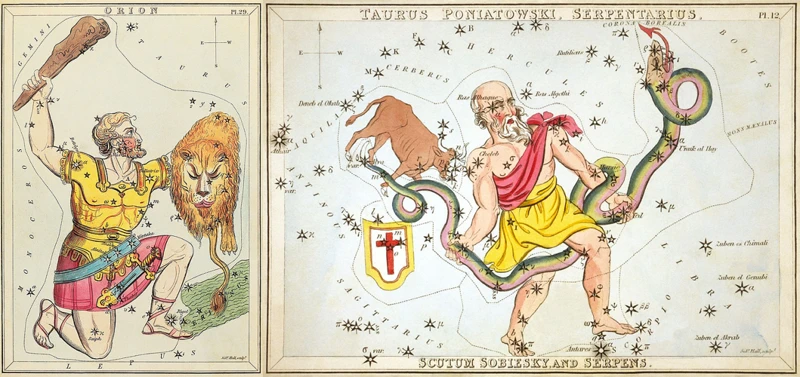
4.1. Influence on Greek and Roman Mythologies
In Greek and Roman mythologies, Ophiuchus holds a significant place, often associated with the legend of Asclepius, the god of medicine and healing. In Greek mythology, Asclepius was the son of Apollo and the mortal woman Coronis. Legend has it that Asclepius possessed exceptional healing abilities, able to resurrect the dead and cure seemingly incurable diseases. His skills became so renowned that Hades, the god of the underworld, grew concerned that his realm would become empty. As a result, Zeus struck Asclepius with a lightning bolt, killing him.
Interestingly, Asclepius was immortalized in the night sky as the constellation Ophiuchus. This connection between Ophiuchus and the god of medicine is further emphasized by the serpent symbolism associated with both the constellation and Asclepius. The staff of Asclepius, entwined by a serpent, is still used as a symbol of medicine today.
4.2. Ophiuchus in Mesopotamian and Egyptian Mythologies
Ophiuchus also finds its place in the mythological narratives of ancient Mesopotamia and Egypt. In Mesopotamian mythology, the constellation is associated with the god known as Nergal. Nergal was a deity of war and the underworld, symbolizing both death and healing. The image of Ophiuchus, with a serpent writhing around him, emblematizes the god’s dualistic nature, representing the power to harm and to heal.
In Egyptian mythology, Ophiuchus may be linked to the deity Imhotep, who was known as the god of medicine, healing, and wisdom. Imhotep was revered as a brilliant physician, architect, and philosopher in ancient Egypt. He was often depicted with a serpent coiled around his head or staff, similar to the imagery associated with Ophiuchus. This connection reinforces the association of Ophiuchus with healing and wisdom in different ancient civilizations.
The presence of Ophiuchus in various ancient mythologies highlights its enduring significance and the cross-cultural recognition of its symbolism. The serpent imagery intertwined with healing and wisdom resonates throughout different cultures, bridging the gaps between ancient civilizations and their belief systems. Ophiuchus serves as a timeless and universal symbol that transcends geographic boundaries and continues to captivate the human imagination.
4.1. Influence on Greek and Roman Mythologies
In Greek and Roman mythologies, Ophiuchus holds a significant influence, intertwining with various legends and deities. In Greek mythology, the constellation of Ophiuchus is associated with the god of medicine, Asclepius. According to the myth, Asclepius was a skilled physician who possessed the ability to heal the sick and even resurrect the dead. Legend has it that Asclepius’s healing skills were so remarkable that they aroused the envy of the gods, particularly Hades, the god of the underworld. This envy led to Asclepius’s demise, as Zeus struck him down with a thunderbolt. In honor of Asclepius’s contributions and abilities, Zeus placed his image among the stars, forming the constellation of Ophiuchus.
In Roman mythology, Ophiuchus is often identified with the legendary figure of Aesculapius, the Roman counterpart of Asclepius. Aesculapius, like Asclepius, was revered as the god of healing and medicine. The Romans believed that Aesculapius could cure any ailment and bring about miraculous recoveries. Temples dedicated to Aesculapius, known as Asclepieia, were built throughout the Roman Empire, serving as centers for medical treatment and religious worship. The presence of Ophiuchus within the mythology of both the Greeks and Romans reflects the deep veneration and reverence for healing and medicine in their cultures.
The influence of Ophiuchus on Greek and Roman mythologies goes beyond its association with Asclepius and Aesculapius. The serpentine symbolism of Ophiuchus is also intertwined with other tales from Greek and Roman mythology. The serpent, representing wisdom, transformation, and regeneration, appears as a motif in various myths and stories. In Greek mythology, the ouroboros, a serpent devouring its own tail, symbolizes eternity and the cyclical nature of life. This symbolism finds parallels in the healing powers attributed to Asclepius/Ophiuchus, representing a continuous cycle of restoration and rejuvenation. In Roman mythology, the serpent is associated with the god Mercury, known as the messenger of the gods and the bringer of knowledge and communication.
The influence of Ophiuchus in Greek and Roman mythologies showcases its role as a celestial entity intricately tied to healing, wisdom, and the divine. By examining the mythological narratives surrounding Ophiuchus, we gain a deeper understanding of the cultural significance placed on this enigmatic constellation and its enduring impact on ancient belief systems.
4.2. Ophiuchus in Mesopotamian and Egyptian Mythologies
Ophiuchus also finds resonance in the mythologies of ancient Mesopotamia and Egypt, further exemplifying its widespread influence. In Mesopotamian mythology, the constellation of Ophiuchus was associated with the god of healing and magic, known as Ningishzida. Often depicted as a serpent with a human head or as a man holding two snakes, Ningishzida was revered for his ability to bring about healing and restoration. In ancient Egyptian mythology, Ophiuchus was linked to the deity Imhotep, who was regarded as the patron of medicine and healing. Imhotep, often depicted as a man holding a staff with serpents wrapped around it, was revered as a wise counselor and a skilled physician. Both Ningishzida and Imhotep serve as powerful symbols of healing and wellness, with Ophiuchus representing the bridging of the human and serpent realms. The presence of Ophiuchus in the mythologies of these ancient civilizations highlights its enduring significance and the widespread recognition of its connection to the healing arts. These ancient beliefs and associations continue to shape our understanding of Ophiuchus today, emphasizing its role as a celestial entity entwined with the concepts of healing, wisdom, and spiritual transformation.
5. Contemporary Perceptions and Interpretations
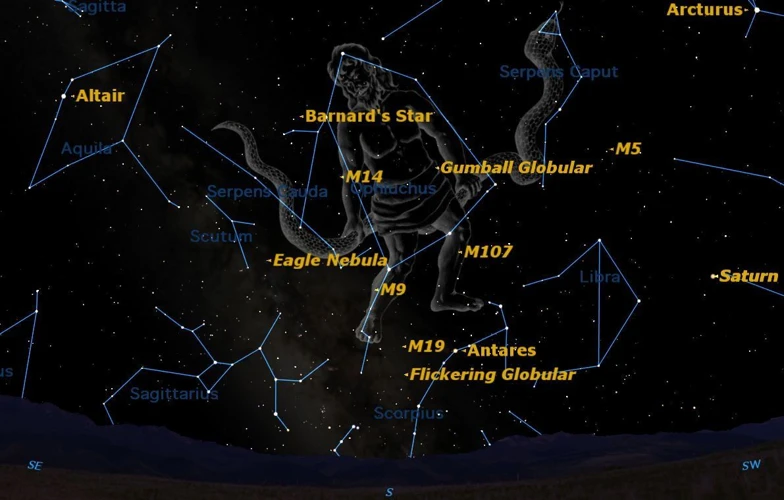
In modern astrology, Ophiuchus has garnered attention and stirred discussions among astrologers and enthusiasts alike. While it may not be recognized as an official zodiac sign, some have embraced the concept of Ophiuchus as an additional astrological influence. Advocates of this viewpoint suggest that individuals born during the Ophiuchus timeframe – November 29 to December 17 – possess unique personality traits and characteristics.
Ophiuchus in Modern Astrology:
– Ophiuchus is often associated with attributes such as wisdom, intuition, and healing capabilities. Those born under this sign are believed to have a natural inclination towards spiritual and esoteric knowledge.
– Supporters of the Ophiuchus sign argue that it brings balance to the zodiac, adding depth and complexity to astrological interpretations. They believe that acknowledging Ophiuchus allows for a more comprehensive understanding of an individual’s astrological profile.
– However, critics argue that the inclusion of Ophiuchus as a zodiac sign deviates from the traditional astrological framework and may dilute the significance of the existing twelve signs. This debate continues to generate varying opinions within the astrological community.
Ophiuchus in Popular Culture:
– Ophiuchus’s presence has extended beyond astrology and into popular culture. It has gained attention on social media platforms and has been the topic of discussion in various online forums.
– The concept of Ophiuchus often sparks curiosity and interest from people seeking alternative forms of self-understanding and personal exploration.
– It has also found its place in various creative works, including literature, art, and music. Artists and writers incorporate Ophiuchus as a symbol of healing, transformation, and the pursuit of spiritual growth.
The contemporary perceptions and interpretations of Ophiuchus vary among astrologers and individuals alike. While not widely recognized as an official zodiac sign, Ophiuchus has captured the fascination of many and continues to be a subject of exploration and interpretation. Whether as an additional sign or a symbol of spiritual awakening, Ophiuchus reflects the ever-evolving nature of astrology and the human desire to unravel the mysteries of the cosmos.
5.1. Ophiuchus in Modern Astrology
Ophiuchus has garnered attention and sparked discussions in modern astrology, with some advocating for its recognition as a 13th zodiac sign. Proponents argue that Ophiuchus represents distinct personality traits and characteristics that should be considered in astrological interpretations. They associate Ophiuchus with attributes such as wisdom, intuition, healing abilities, and a strong connection to nature. Individuals born between November 29 and December 17, according to this alternative perspective, are said to possess these qualities.
However, it is important to note that this viewpoint is not universally accepted within the astrological community. Traditional astrology, based on the 12-zodiac sign system, does not recognize Ophiuchus as a separate sign. Skeptics argue that introducing Ophiuchus as a zodiac sign would disrupt the established astrological framework.
Nevertheless, the concept of Ophiuchus as a new zodiac sign has captured the imagination of many, prompting discussions and curiosity about its impact on one’s astrological profile. Some enthusiasts delve into personality traits and compatibility analyses, seeking to understand how Ophiuchus might influence their lives. Others find interest in exploring the potential connection between Ophiuchus and specific career paths or life choices.
While Ophiuchus’ role in modern astrology remains a topic of ongoing debate, its inclusion or exclusion as a zodiac sign offers a fascinating insight into the evolving nature of astrology and the human fascination with celestial influences on individual lives. Whether one embraces Ophiuchus as a valid zodiac sign or sees it as an intriguing concept, its presence in modern astrology demonstrates the enduring allure of the stars and their potential impact on human existence.
5.2. Ophiuchus in Popular Culture
Ophiuchus has also made its mark in popular culture, appearing in various forms of media and entertainment. Its unique symbolism and mythical associations have captured the imagination of artists, writers, and filmmakers. In the realm of literature, Ophiuchus has found its way into fantasy novels and science fiction stories, often portrayed as a powerful healer or a mysterious figure with hidden knowledge. Its association with the serpent and healing abilities has inspired characters with similar traits in fictional works.
In the world of cinema, Ophiuchus has made appearances in movies and TV shows, sometimes as a central character and other times as a reference in the background. Its symbolic representation as a healer or a guardian of ancient knowledge has been used to create intriguing storylines and add a mystical element to the plot. Ophiuchus has also been portrayed in various forms of artwork, with artists often drawing inspiration from its celestial shape and mythical connections.
In the realm of music, Ophiuchus has been referenced in song lyrics and album artwork. Artists have used its symbolism to convey messages of healing, transformation, and spiritual growth. Ophiuchus’ association with the serpent has also been connected to themes of temptation, wisdom, and rebirth in musical compositions.
In the world of fashion and design, Ophiuchus has inspired clothing lines, accessories, and jewelry. Its distinct shape and mythical connotations have been incorporated into various fashion trends, allowing individuals to embody the essence of this mysterious constellation in their personal style.
Ophiuchus’ presence in popular culture showcases its enduring appeal and the fascination it holds for artists, creators, and consumers alike. Whether as a symbol of healing, a representation of ancient wisdom, or simply as an intriguing element in storytelling, Ophiuchus continues to captivate and inspire diverse forms of artistic expression.
Conclusion

In conclusion, examining the astronomical influences on Ophiuchus in ancient mythology reveals a fascinating blend of celestial significance and mythical storytelling. From its introduction in astronomy as a recognized constellation by Claudius Ptolemy to its association with the Greek god of medicine, Ophiuchus has intrigued astronomers and mythologists throughout history. While not traditionally recognized as an astrological sign, Ophiuchus has sparked discussions and debates in modern astrology, with some advocating for its inclusion as a 13th zodiac sign. Its unique symbolism, position in the sky, and connections to healing and medicine have contributed to its continued significance and interpretation in both ancient and contemporary contexts. Additionally, Ophiuchus has made its way into popular culture, further solidifying its place in the collective imagination. Whether studying Ophiuchus for its astronomical properties, exploring its mythology, or contemplating its astrological implications, this enigmatic constellation offers a captivating glimpse into the intertwined worlds of the celestial and the human. As our understanding of the cosmos continues to evolve, Ophiuchus will undoubtedly remain a subject of intrigue and wonder.
Frequently Asked Questions
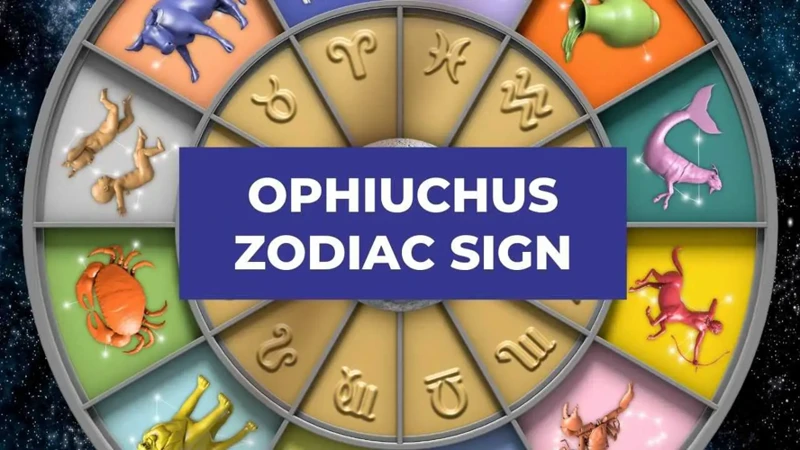
1. What is the significance of Ophiuchus?
Ophiuchus holds significance both in astronomy and mythology. Astronomically, it is a constellation representing the Serpent Bearer. In mythology, Ophiuchus is associated with healing, wisdom, and medicine.
2. Is Ophiuchus considered a zodiac sign?
Ophiuchus is not traditionally recognized as one of the zodiac signs. However, there is ongoing debate about its inclusion as a 13th zodiac sign due to its position in the sky and its potential astrological influences.
3. Who was Asclepius, and what is his connection to Ophiuchus?
Asclepius was a Greek god of medicine, often depicted with a staff entwined by a serpent. Ophiuchus is believed to represent Asclepius due to its shape resembling his staff, symbolizing healing and medical knowledge.
4. What are the personality traits associated with Ophiuchus?
For those who believe in Ophiuchus as an astrological sign, personality traits associated with it include wisdom, intuition, charisma, and a desire to heal and help others.
5. Can Ophiuchus influence career choices?
Some individuals believe that Ophiuchus can influence career choices. Those born under this sign may be drawn to professions in healthcare, alternative medicine, counseling, or other helping professions.
6. How does Ophiuchus differ from other constellations?
Ophiuchus stands out from other constellations as the only one that does not represent an astrological sign. Its presence challenges the traditional alignment of the zodiac calendar.
7. Are there any historical observations or mentions of Ophiuchus?
Ancient civilizations, such as the Greeks and Romans, made observations and referenced Ophiuchus in their mythologies, recognizing its connection to healing and medicine.
8. How has modern astrology incorporated Ophiuchus?
In modern astrology, there are different interpretations regarding Ophiuchus. Some include it as a zodiac sign, while others still adhere to the traditional twelve signs.
9. Where can Ophiuchus be seen in the night sky?
Ophiuchus can be observed near the celestial equator and is visible in both the northern and southern hemispheres.
10. How is Ophiuchus portrayed in popular culture?
Ophiuchus has made appearances in various forms of popular culture, including literature, art, and even video games. It often represents themes of healing, mystery, and the blending of science and spirituality.
References
- Ophiuchus
- How to Find Ophiuchus: The Serpent-bearer Constellation
- Ophiuchus | Astrology, Zodiac, Mythology
Frequently Asked Questions

1. What is the significance of Ophiuchus in ancient mythology?
Ophiuchus holds a special place in ancient mythology as the Serpent Bearer and the thirteenth sign of the zodiac. Its association with healing, wisdom, and the power to control serpents makes it a unique and intriguing figure.
2. How was Ophiuchus introduced in astronomy?
Ophiuchus was first recognized as a constellation by Greek astronomer Claudius Ptolemy in the 2nd century. It is located along the celestial equator and can be found between the constellations of Scorpius and Sagittarius.
3. What role does Ophiuchus play in astrology?
In astrology, Ophiuchus is often considered the “hidden” or “forgotten” sign due to its addition to the zodiac system. Some astrologers believe that individuals born under this sign possess unique traits such as healing abilities, a strong sense of justice, and a deep connection to the spiritual realm.
4. What are the mythological origins of Ophiuchus?
The mythological origins of Ophiuchus trace back to ancient Greece, where it is associated with the legendary healer Asclepius. According to the myth, Asclepius was granted the power to bring the dead back to life, a skill that attracted the attention and jealousy of the gods.
5. What is the symbolism behind the Serpent Bearer?
The Serpent Bearer represents the duality of Ophiuchus – the ability to heal and the power to harm. The serpent coiled around the figure’s body symbolizes the control over the intricate forces of life and death, as well as the cycle of rebirth.
6. What is the connection between Ophiuchus and the constellation?
Ophiuchus is both the name of the thirteenth zodiac sign and the constellation it is associated with. The constellation itself depicts a male figure holding a serpent, aligning with the mythological representation of the Serpent Bearer.
7. How did Ophiuchus influence Greek and Roman mythologies?
In Greek and Roman mythologies, Ophiuchus is often associated with the healing god Asclepius. Asclepius’ extraordinary healing skills and eventual transformation into a constellation reflect the prominence and influence of Ophiuchus in these mythological traditions.
8. What role did Ophiuchus play in Mesopotamian and Egyptian mythologies?
In Mesopotamian and Egyptian mythologies, Ophiuchus was also associated with healing and wisdom. In Mesopotamia, the constellation was linked to the god Gilgamesh, while in Egypt, it symbolized Imhotep, a renowned physician and architect.
9. How is Ophiuchus perceived in modern astrology?
In modern astrology, some astrologers recognize Ophiuchus as a valid zodiac sign. Those born under Ophiuchus are believed to possess traits such as intuition, healing abilities, and a deep understanding of the mysteries of life.
10. How does Ophiuchus feature in popular culture?
Ophiuchus has made appearances in various forms of popular culture, including literature, movies, and video games. It often represents characters who possess extraordinary healing powers or possess deep spiritual wisdom.






